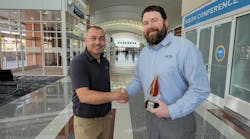By John F. Infanger, Editorial Director
A Threat That Transcends
Industry reps talk customs, regulations, and the role business has to play
CHICAGO - The International Cargo Security Summit held here in July had
the underlying current of terrorism and security as a nationwide - and
businesswide - issue in which the private sector needs to work with government,
not be dictated by it. Key topics: changing U.S. Customs procedures, changing
regulations, and an emphasis on
managing the risks that are manageable.
The summit was hosted
by Worldwide Convention and Business Forums, a security intelligence solutions
resource. Attendees: those involved in the freight/logistics supply chain
from various industries, including aviation, and government.
Comments John Goldsworthy, security manager for international integrator
TNT Express, "We're getting layer upon layer of requirements when
we don't even know if the first layer works.
"What we need is a clarity of objectives. Who is responsible for
what, when, and where?"
Assessing The Risk
Alexander Tabb is associate managing director for Kroll, Inc., a crisis
management and security consulting firm. He says companies need to perform
vulnerability/risk assessments to better understand where to target their
limited resources. "Some risks have to be accepted," he says.
"Be concerned with those things you can control," Tabb advises.
For example, he says, dirty bombs have been a well-pubicized threat but
in fact such bombs are difficult to make and to safely detonate. Explosives,
meanwhile, are a much more real threat that can be countered more readily.
At the same time, he points out, security is not supposed to impede a
process, it's to protect the process.
Eye On Government
Presenters here caution companies involved with the movement of freight
about government regulations and initiatives that are being implemented
or may be in the offing. In particular, two key agencies, the U.S. Customs
Service and the Federal Drug Administration, may have conflicting requirements
of goods and the companies moving them.
Customs is currently charged with devising manifest guidelines for air
cargo, due this fall. According to James Calderwood, an attorney with
Zucker, Scoutt & Rosenberger, Customs is considering a 12-hour notification
requirement before cargo requires Customs clearance, he says, and possible
8 hours for the overnight express industry. Says Calderwood, "I have
a feeling there will be a problem."
At the same time, he says that the FDA is proposing a 12-hour notice for
the import of food, which would affect air cargo operators. It is part
of FDA's increased oversight as a result of the Trade Act of 2002 that
will require companies to respond to any FDA questions about goods within
four hours. It also requires all goods be tracked electronically.
Of particular interest at the Chicago meeting was the Customs Trade Partnership
Against Terrorism - or, C-TPAT, a joint initiative by industry and Customs
to pre-clear companies and their security processes and training. Major
companies such as Target, represented here, have been first on board with
Customs to facilitate the movement of their goods. The biggest caution,
say officials, who agree C-TPAT offers great potential for moving goods
while guarding against terrorism, is that companies that don't participate
will find they must endure more inspections. They also run the risk of
being less competitive against those with approved security programs.
Kroll's Tabb explains that C-TPAT is a radical shift for Customs, which
traditionally was first and foremost a revenue-generating division of
government. The intent is to bring industry and government closer together
to more reasonably reduce the terror threat.
With C-TPAT, says Tabb, any company can apply and there are no specific
standards, per se. Rather, the strength of the program is that it's an
agreement between a company and Customs that a dedicated security program
will be instituted and adhered to, says Tabb. The company designs a program
that best fits its needs, he explains, and Customs then monitors the follow-through.
About
WCBF
Worldwide Conventions and Business Forums offers security intelligence
solutions services, including the International Cargo Security Summit
- Counter Terrorism Strategies for Freight Transportation and Logistics
Supply Chain.
For information, visit www.wcbf.com.






